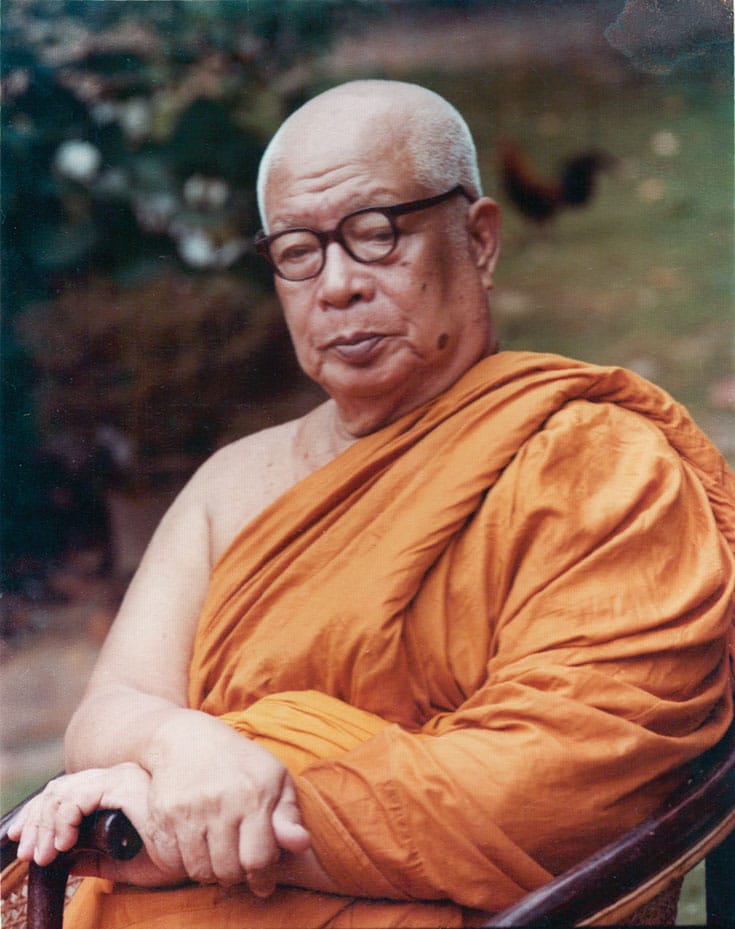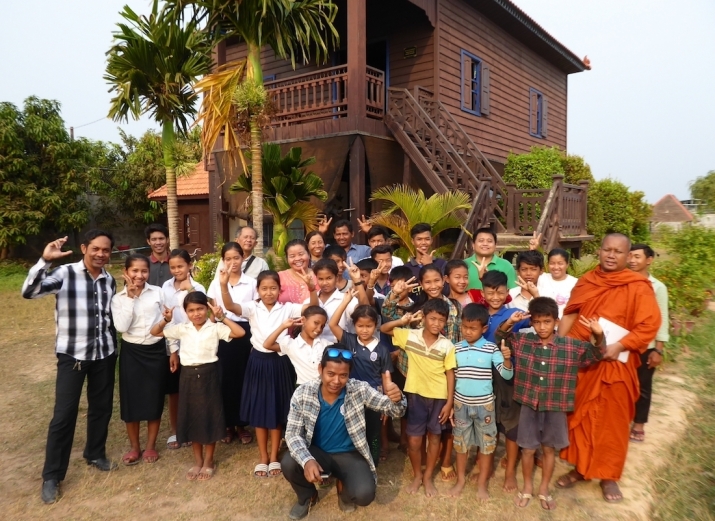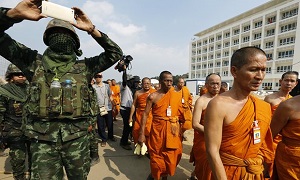
Dharma companions is a blog focusing on Dharma activities, information dissemination and bringing awareness to the multifaceted aspects of Buddhism for the community from Shah Alam Buddhist Society (SABS). Postings should be of interest to Buddhist and anyone who seeks information on Buddhism. As the title suggest, we also aim to be a companion to those who seeks our company in this path that we undertake. May you be well, happy and peaceful.
Saturday, April 8, 2017
Wisdom

Labels:
Understanding
Location:
Shah Alam, Selangor, Malaysia
The Choice Is Yours
BY AJAHN BUDDHADASA| Lion's Roar
There are two ways to understand dependent origination, teaches Ajahn Buddhadasa. But only one leads to liberation
 Ajahn Buddhadasa. Courtesy of Buddhadasa Indapanyo ArchIves (Bangkok).
Ajahn Buddhadasa. Courtesy of Buddhadasa Indapanyo ArchIves (Bangkok).
In the Pali suttas there are two descriptions of what occurred under the Bodhi tree at the time of the Buddha’s great awakening. In one version, appearing in various texts, the Buddha realized the three supreme knowledges. In the first true knowing, as it is generally understood, he recollected his former lives. In this account, as traditionally understood, he is able to recall his own previous births far into the distant past. These are invariably described as happening to the same person. In the second true knowing, he reviewed how beings carry on according to their actions (cutupapatañana), how beings pass away and reappear according to the karma they have done. Through the third true knowing, he realized the destruction of the impulses (asavakkhyañana). The out-flowing fermentations (asavas) are the deepest level of defilement; when they are completely ended, no further defilement, egoism, or suffering is possible. This is the more commonly recounted description of the night of the Buddha’s awakening.
Labels:
Teacher,
Understanding
Location:
United States
Friday, April 7, 2017
Salvation Centre Cambodia — Fighting HIV/AIDS with the Buddha’s Army
By Shuyin Buddhistdoor Global 2017-03-17

All smiles at one of SCC's Livelihood Centers in Siem Reap
Staring blankly into space, Pat Sorm sits on the steps of her house, hugging a photo of her son who died just a week earlier. Khon Kha was working in the military and had just turned 40. He had battled with AIDS for the last 10 years of his life. A funeral ceremony was performed in a simple, yet dignified manner, with support from a donation of US$30 that Pat Sorm received from the Salvation Centre Cambodia (SCC). Cremation alone had cost some US$50, but she was at least comforted that the proper Buddhist rituals would allow her son to move on in peace.
Labels:
Inspirational,
Skillful Practice
Location:
Krong Siem Reap, Cambodia
How Ajahn Cagino started Dhammagiri.
“I walked for 16 years around this country. Sometimes alone and sometimes accompanied by others. We don’t travel the way you do because we are supposed to wear only 3 layers of clothes and possess very few things. We don’t care how far we walk, the most important thing is to be aware of yourself. Most of the time we meditate. If you want your body to be healthy, then you exercise but if you want a healthy heart, you should meditate. Just let your heart relax. There should be no attachments whatsoever. Many people help us on our way by giving us shelter or food but even I have accepted food on my journey, it’s important to have no attachments.”
‘Buddhism relevant in today’s era’
by Amarnath Tewary, The Hindu, March 19, 2017
Patna, India -- At Nalanda conclave, President Mukherjee says no part of the world is free from scourge of violence
 Addressing the closing ceremony of a three-day International Buddhist Conclave in Rajgir in Nalanda, President Pranab Mukherjee on Sunday said the philosophy of Buddhism is as relevant today as ever in the era of violence, “especially as the world grapples with the complex problems that seem intractable”.
Addressing the closing ceremony of a three-day International Buddhist Conclave in Rajgir in Nalanda, President Pranab Mukherjee on Sunday said the philosophy of Buddhism is as relevant today as ever in the era of violence, “especially as the world grapples with the complex problems that seem intractable”.
Bihar Chief Minister Nitish Kumar and Governor Ram Nath Kovind too addressed the conclave, organised by the Nava Nalanda Mahavihara.
Patna, India -- At Nalanda conclave, President Mukherjee says no part of the world is free from scourge of violence
 Addressing the closing ceremony of a three-day International Buddhist Conclave in Rajgir in Nalanda, President Pranab Mukherjee on Sunday said the philosophy of Buddhism is as relevant today as ever in the era of violence, “especially as the world grapples with the complex problems that seem intractable”.
Addressing the closing ceremony of a three-day International Buddhist Conclave in Rajgir in Nalanda, President Pranab Mukherjee on Sunday said the philosophy of Buddhism is as relevant today as ever in the era of violence, “especially as the world grapples with the complex problems that seem intractable”.Bihar Chief Minister Nitish Kumar and Governor Ram Nath Kovind too addressed the conclave, organised by the Nava Nalanda Mahavihara.
Labels:
Conference,
Speech
Location:
Patna, Bihar, India
Thursday, April 6, 2017
AVOID COMPANIONSHIP WITH THE FOOLISH
Labels:
Dhammapada
Location:
Shah Alam, Selangor, Malaysia
Buddhist Authorities in Myanmar Warn Outspoken Monk to Adhere to Ban on Public Sermons
by Kyaw Thu, RFA’s Myanmar Service, March 20, 2017
 Wirathu, vice chairman of Myanmar's ultranationalist Ma Ba Tha Buddhist movement, stands silently behind a lectern in Mandalay, March 2017.
Wirathu, vice chairman of Myanmar's ultranationalist Ma Ba Tha Buddhist movement, stands silently behind a lectern in Mandalay, March 2017.RFA
The Mandalay Sangha Maha Nayaka Committee informed Wirathu, vice chairman of the Ma Ba Tha Buddhist organization, that if he does not follow an order issued by the State Sangha Maha Nayaka (Ma Ha Na), it will take action against him, committee secretary Razeinna told RFA’s Myanmar Service.
Labels:
Announcement,
Opinion
Location:
Yangon, Myanmar (Burma)
Wednesday, April 5, 2017
How to listen to the teaching?

Thai authorities seek to defrock scandal-hit Buddhist abbot
by Oliver Holmes, The Guardian, 10 March 2017
Ruling junta has kept Dhammakaya temple under siege for nearly three weeks in bid to find monk wanted for money launderingBangkok, Thailand -- Thailand’s highest religious body has begun a process that could defrock a Buddhist abbot wanted for money laundering, escalating a conflict between the military government and a hugely popular temple.
 A Thai soldier takes a photograph during the search of the Dhammakaya complex. Photograph: Narong Sangnak/EPA
A Thai soldier takes a photograph during the search of the Dhammakaya complex. Photograph: Narong Sangnak/EPAThe Dhammakaya complex in northern Bangkok has been under siege for nearly three weeks, with more than 4,000 police officers failing to find the sect’s 72-year-old spiritual leader.
Despite orders to vacate the 1,000-acre complex, monks and volunteers have remained. Three searches by police have found nothing.
Tuesday, April 4, 2017
Honoring the Departed Qingming 清明
"I tell you, monks, there are two people who are not easy to repay. Which two?
Your mother & father.
Even if you were to carry your mother on one shoulder & your father on the other shoulder for 100 years, and were to look after them by anointing, massaging, bathing, & rubbing their limbs, and they were to defecate & urinate right there [on your shoulders], you would not in that way pay or repay your parents. If you were to establish your mother & father in absolute sovereignty over this great earth, abounding in the seven treasures, you would not in that way pay or repay your parents.
Labels:
Teacher,
Understanding
Location:
Shah Alam, Selangor, Malaysia
Engaged Buddhism: Hong Kong Buddhists seek more participation in politics and leadership race
11 March 2017 00:10
Ellie Ng Hong Kong Free Press
A group of Buddhists is seeking greater participation in politics, and is seeking to meet with religious leaders who will be voting in Hong Kong’s leadership election at the end of this month.
The citizen-led Buddhist Concern Alliance is running a petition campaign demanding talks with the ten Buddhist leaders who have a vote in the leadership race. Nine of the ten leaders nominated candidate Carrie Lam last month, while the last one did not submit a nomination.

Yawen Chan (R) of the Buddhist Concern Alliance. Photo: HKFP/Ellie Ng.
Be here and now
Monday, April 3, 2017
JOY OF MEDITATION
Simple Joys by Piya Tan ©2016
The secret to successful Buddhist meditation is JOY (pāmojja). This joy is more than the ordinary worldly “joy” which is external and “thing” based. It is not as powerful as ZEST or joyful interest (pīti), which is found in the first and second dhyanas. It is the kind of joy we feel when we have completed a task, and now have nothing to do. We often forget this vital kind of joy because we are quickly lost in other worldly things.
Freedom from Fear
1. Creating thousand hands with weapons
armed was Mara seated on the trumpeting,
ferocious elephant, Girimekhala.
Him, together with his army, did the Lord of Sages
subdue by means of generosity and other virtues.
By its grace, may joyous victory be thine.
armed was Mara seated on the trumpeting,
ferocious elephant, Girimekhala.
Him, together with his army, did the Lord of Sages
subdue by means of generosity and other virtues.
By its grace, may joyous victory be thine.
Bāhuṃ sahassamabhinimmita-sāyudhantaṃ
Girimekhalaṃ uditaghora-sasenamāraṃ
Dānādi-dhammavidhinā jitavā munindo
Taṃ tejasā bhavatu to jayamaṅgalāni
Girimekhalaṃ uditaghora-sasenamāraṃ
Dānādi-dhammavidhinā jitavā munindo
Taṃ tejasā bhavatu to jayamaṅgalāni
Labels:
Teacher,
Understanding
Location:
Shah Alam, Selangor, Malaysia
Sunday, April 2, 2017
Muni Sutta (Sutta Nipata SN1.12)
Labels:
Understanding
Location:
Shah Alam, Selangor, Malaysia
A history of Buddhist Social Engagement
March 14, 2017 by Justin Whitaker
......until the fourfold assembly were properly trained
Ānandajoti Bhikkhu
The fourfold assembly, as illustrated in the murals of Wat Pho, monks and laymen are on the Buddha's right; nuns and lay women on his left. The Buddha once told Māra that he would not attain parinibbāna until the fourfold assembly were properly trained,
Labels:
Teacher,
Understanding
Location:
Shah Alam, Selangor, Malaysia
Subscribe to:
Comments (Atom)











